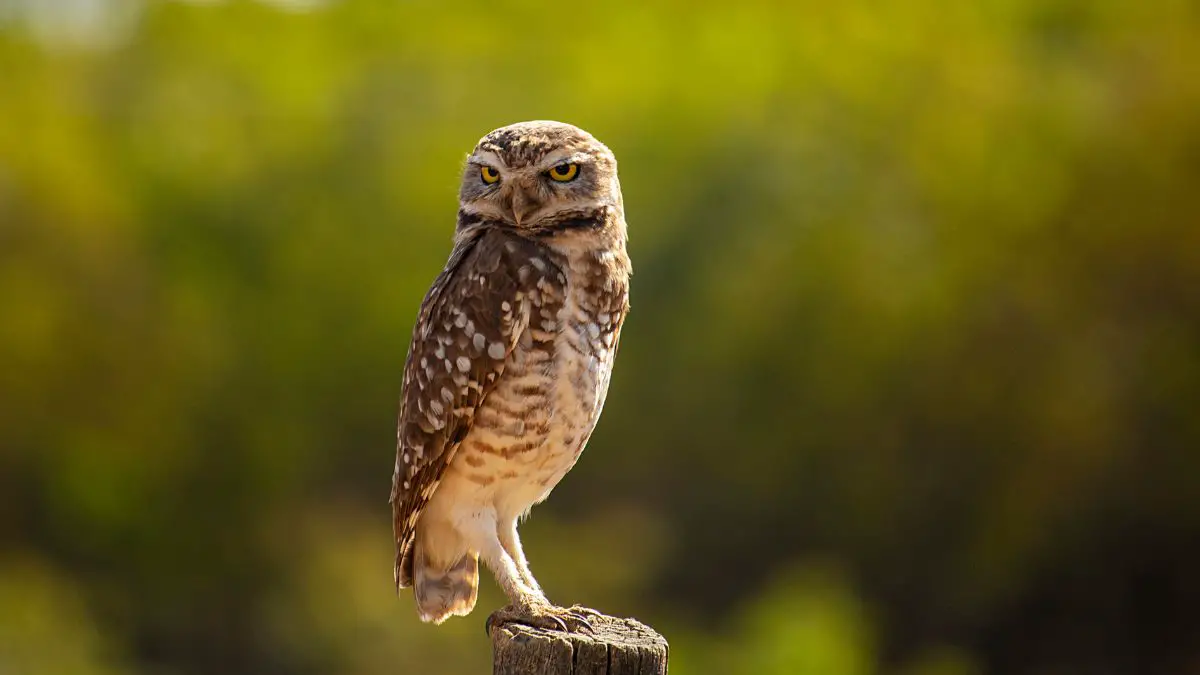Ever wondered, ‘Do owls need sunlight?’ Let’s break it down.
Owls are mostly nocturnal, meaning they’re active at night. While they don’t need sunlight in the same way humans do, it doesn’t mean they can entirely do without it.
Owls have exceptional night vision adapted for low light, but some exposure to sunlight is beneficial. Sunlight helps them synthesize vitamin D, crucial for their overall health.
Even though they’re more active in the dark, a bit of natural light or well-lit environments can be good for their well-being.
So, while owls don’t depend on sunlight like we do, a balanced exposure can positively impact their health and behavior.
Want to learn more about why owls shouldn’t avoid sunlight? Keep reading.
The Nocturnal Nature of Owls
Owls are predatory birds, and one of their most distinctive features is their nocturnal nature. Unlike us diurnal beings who soak up the sun’s rays, owls prefer to spread their wings under the moonlight.
But why? Well, it’s all about their adaptation to low light conditions.
You see, owls have evolved over time to become experts in navigating the darkness. Their eyes are marvels of nocturnal prowess.
Unlike ours, their eyes are large and forward-facing, giving them a binocular vision that helps them perceive depth even in the dimmest of lights. But that’s not all – the magic lies in their exceptional night vision.
Owls’ eyes are packed with specialized cells called rod cells, which are super sensitive to light. This adaptation allows them to detect even the faintest glimmers in the dark.
The unique structure of their eyes isn’t the only nocturnal superhero move in owls’ repertoire. Their facial discs, those distinctive feather arrangements around their faces, serve as incredible sound collectors.
This helps them locate prey with remarkable precision in the hush of the night.
Sunlight and Owl Behavior
Have you ever wondered if owls have any use for sunlight? Well, the answer might surprise you. While owls are renowned for their nocturnal habits, they aren’t completely sun-shy creatures.
Owls don’t actively seek sunlight as a cat might seek a sunbeam, but they do have some interesting behavioral patterns related to sunlight exposure. For instance, you might catch an owl catching some rays during their downtime.
Though not a regular occurrence, some species of owls have been observed basking in the sunlight, especially during the cooler morning hours and also soon after a rain. It’s like a feathery spa day for them!
These brief sun-soaking sessions serve a purpose beyond relaxation. Sunlight helps regulate their body temperature, and the vitamin D they absorb from the sun contributes to their overall health. It’s almost like they’ve got their own wellness routine going on.
So, while owls might not be on the lookout for a sunny spot like your cat, they do appreciate a bit of sunshine for its practical perks.
It’s just another fascinating aspect of these enigmatic birds, reminding us that even the creatures of the night can’t resist a good dose of sunlight now and then.
The Importance of Sunlight for Owls
Vitamin D Synthesis
Ever wondered if owls need sunlight? While these nocturnal birds are masters of the moonlight, sunlight plays a complimentary role in their well-being, especially when it comes to synthesizing vitamin D.
Unlike humans who soak up vitamin D directly from the sun, owls have a unique method. They obtain this vital nutrient through their diet.
Owls consume prey that already contains vitamin D, ensuring they get the necessary dose without basking in direct sunlight. This adaptation showcases nature’s ingenuity in meeting the needs of these fascinating creatures.
Vitamin D is not just a buzzword for health enthusiasts; it’s a key player in owl health. It aids in the absorption of calcium, essential for strong bones and overall physiological balance.
So, while owls might not be catching sunbeams like your pet cat, they’ve got their dietary game on point.
Circadian Rhythms in Owls
Now, let’s explore the world of circadian rhythms, the internal clocks that govern sleep-wake cycles.
Owls, being creatures of the night, have circadian rhythms that differ from their diurnal counterparts. Sunlight plays a pivotal role in regulating these rhythms. Exposure to sunlight influences when owls choose to be active or take a well-deserved nap.
It’s like sunlight acts as a conductor, orchestrating their nocturnal symphony.
So, do owls need sunlight? Yes, but not in the way we do. For owls, sunlight isn’t just about warmth or leisure; it’s a silent contributor to their health and the rhythm of their nightly adventures.
Owls in Captivity: Sunlight Requirements
Owl Care and Sunlight
Caring for owls in captivity comes with its own set of considerations, and one crucial aspect is sunlight.
Guidelines for owl care stress the importance of providing adequate light, and while natural sunlight is ideal, it’s not always feasible.
In captivity, artificial light steps in as a reliable substitute, ensuring that our feathered friends receive the light they need for their well-being.
However, it’s not without its challenges. Creating an environment that mimics the natural light conditions can be tricky, but it’s essential. Owl enthusiasts and caregivers at zoos have devised ingenious solutions, using specially designed lighting systems that replicate the intensity and spectrum of sunlight.
These artificial setups not only meet the owls’ light requirements but also contribute to their overall health and vitality.
Sunlight and Owl Rehabilitation
When it comes to rehabilitating injured or orphaned owls, sunlight plays a significant role. Natural sunlight exposure is crucial for their physical and mental recovery. Striking the right balance is an art, as too much exposure might overwhelm the sensitive creatures.
Success stories abound, showcasing instances where careful management of sunlight exposure has contributed to the rehabilitation triumphs of these majestic birds.
In the realm of owl rehabilitation, sunlight is a key player, aiding in the restoration of their natural behaviors and promoting a successful return to the wild.
These case studies highlight the delicate dance between sunlight, care, and the resilience of these enigmatic creatures in captivity.
Conclusion
In wrapping up our exploration into whether owls need sunlight, the answer is a nuanced yes.
Sunlight holds vital importance for owls, even in captivity. Whether you’re an owl enthusiast, caretaker, or involved in rehabilitation, providing adequate light which is essential, is key to their well-being.
The careful balance of natural and artificial light, as discussed, ensures that these creatures thrive in captivity, maintaining their health and natural behaviors.
So, for those with a penchant for these nocturnal wonders, remember, a touch of sunlight goes a long way in the world of owl care.



